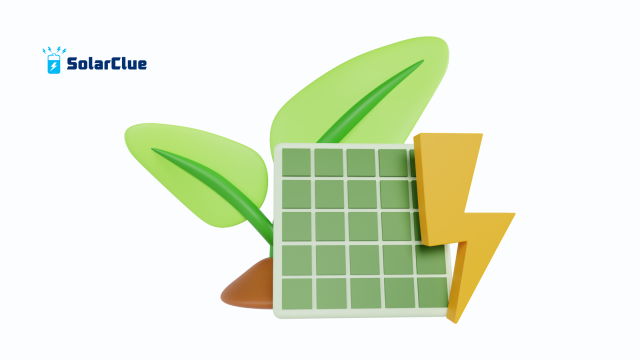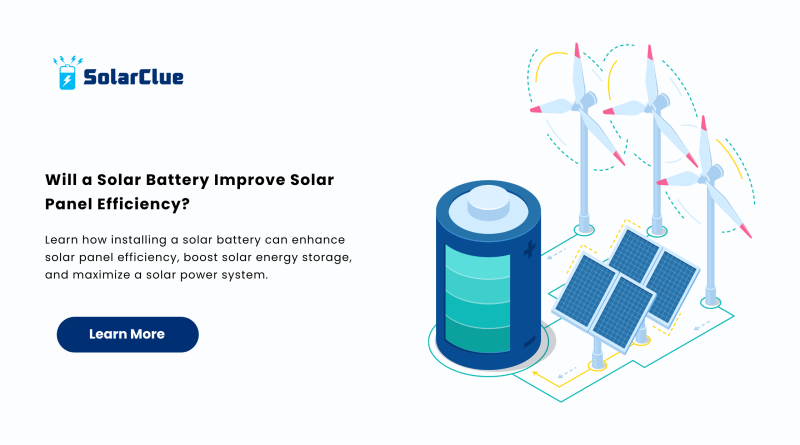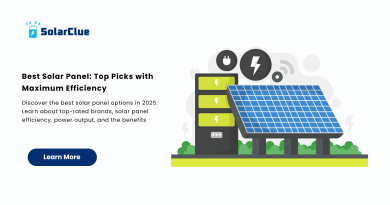Will a Solar Battery Improve Solar Panel Efficiency?
In 2025, the adoption of clean energy has surged, and with that comes the growing curiosity: Will installing a solar battery improve the efficiency of an existing solar panel? For those already generating their own solar energy, adding a battery might seem like the logical next step. But how does it really impact energy output and overall solar system performance?
Let’s explore how a solar battery affects a setup and whether it truly boosts a solar power system’s efficiency.
Table of Contents
- 1 Understanding Solar Panel Efficiency
- 2 What Is a Solar Battery?
- 3 Does a Solar Battery Improve Solar Panel Efficiency?
- 4 The Benefits of Solar Battery Integration
- 5 Types of Solar Batteries
- 6 Integration: How a Solar Battery Works with Existing Panels
- 7 Cost Considerations
- 8 Real-World Example: Energy Efficiency in Action
- 9 When Is the Right Time to Install a Solar Battery?
- 10 Environmental and Social Responsibility
- 11 Conclusion: A Smarter Solar Future
- 12 FAQs
Understanding Solar Panel Efficiency
To begin with, let’s clarify what solar panel efficiency actually means. It refers to how much sunlight a solar panel can convert into usable electricity. However, the actual electricity that can be used also depends on when power is needed and whether excess energy can be stored.
Most standard systems without a solar battery send excess energy back to the grid. While this reduces the utility bill, there’s still dependency on the grid when the sun isn’t shining. That’s where the concept of solar battery efficiency enters the picture.
What Is a Solar Battery?
A solar battery is a device that stores excess electricity generated by a solar panel. Instead of letting unused energy go to waste or to the grid, the battery holds onto it for later use. This stored solar energy can be used at night or during a power outage, making a solar system more self-reliant.
Does a Solar Battery Improve Solar Panel Efficiency?
Technically, a solar battery does not increase the conversion rate of sunlight into electricity. However, it improves the functional efficiency of a solar power system. Here’s how:
- Maximized Usage: More of the energy produced by the panels is used.
- Reduced Grid Dependency: There is less reliance on external energy sources.
- Peak Shaving: Stored energy can be used during peak hours when grid rates are higher.
So while it doesn’t make a solar panel more “efficient” in scientific terms, it absolutely makes a solar system more productive and valuable.
The Benefits of Solar Battery Integration
Adding a solar battery to an existing system brings several game-changing benefits:
1. Energy Independence
No longer completely tied to the grid, a solar power setup with storage becomes a round-the-clock resource.
2. Increased Return on Investment (ROI)
Because more self-generated electricity is used, utility bill savings increase. This makes the overall solar system more cost-effective in the long term.
3. Protection Against Outages
A properly sized solar battery provides backup power, adding resilience during blackouts or natural disasters.
4. Environmental Impact
By consuming more clean solar energy, the demand on fossil-fuel-powered grids is reduced, lowering carbon footprint.
Types of Solar Batteries

When considering battery storage, several options are available:
- Lithium-Ion Batteries: High efficiency, long lifespan, minimal maintenance.
- Lead-Acid Batteries: Lower cost but shorter lifespan and less efficient.
- Flow Batteries: Emerging tech with scalable storage, still expensive.
Choosing the right type of solar battery depends on energy needs, budget, and available space.
Integration: How a Solar Battery Works with Existing Panels
If a solar panel system is already installed, adding a solar battery is typically straightforward. The system simply reroutes excess power to the battery after the home’s energy demand is met. A smart inverter manages this flow efficiently, ensuring the most effective use of stored solar energy.
Modern solar power systems often come with hybrid inverters that are battery-ready, simplifying future integration.
Cost Considerations
While adding a solar battery does come with upfront costs, it’s a long-term investment. Government subsidies and net metering schemes often offset the initial expense. Plus, falling battery prices in 2025 make it more accessible than ever.
The long-term savings and benefits typically outweigh the cost over the battery’s lifespan.
Real-World Example: Energy Efficiency in Action
Consider a scenario in Bengaluru where a homeowner installed a solar panel system in 2021. By 2024, a solar battery was added after observing that excess energy was going to the grid without compensation. By 2025, reports indicated:
- A 60% reduction in grid reliance
- Complete coverage during power cuts
- Enhanced satisfaction with the solar power system
This setup not only improved energy independence but also increased property value.
When Is the Right Time to Install a Solar Battery?
Now is an excellent time. With evolving technologies, better storage capabilities, and increased incentives, the value of a solar battery has never been higher.
If installing a new solar system, include battery storage in the design. For existing solar panels, consult an expert to evaluate battery compatibility.
Environmental and Social Responsibility
Going solar isn’t just a smart financial decision—it’s a commitment to sustainability. Integrating a solar battery maximizes this commitment by ensuring that clean energy isn’t wasted but instead fully utilized.
In the broader scope, widespread adoption of solar batteries and panels can lead to reduced strain on national grids and greater energy equity.
Conclusion: A Smarter Solar Future
While a solar battery doesn’t enhance the technical efficiency of a solar panel, it significantly improves a system’s functional efficiency, resilience, and return on investment. It’s an upgrade that turns a good solar power system into a great one.
For expert advice on integrating a solar battery into a system, visit solarclue.com. For more insights and updates, check out blog.solarclue.com.
Upgrade the solar journey today and power the future with confidence.
FAQs
1. Will a solar battery increase the energy output of a solar panel?
Not directly, but it improves how much of that energy can be used, making the system more efficient overall.
2. How long do solar batteries last?
Most modern solar batteries last between 10 to 15 years, depending on usage and maintenance.
3. Can a solar battery be added to an existing solar system?
Yes, most systems can be upgraded with a battery, especially if they use a hybrid inverter.
4. What is the best solar battery option for homes?
Lithium-ion batteries are currently the most popular due to their efficiency and long lifespan.
5. Is it worth the cost to install a solar battery?
Absolutely. While the upfront cost is significant, the long-term savings and energy independence are well worth it.
Take the next step towards energy independence. Visit solarclue.com – because energy control should be in your hands.



